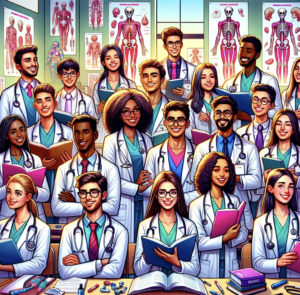
Many college aspirants use the summer before their senior year of high school to write their personal statements. We’ll be doing a full, detailed day-by-day video series on how to build a college personal statement in late July (follow our YouTube channel to make sure you’re notified when it drops), but for now, we wanted to give you a quick five-part guide with some tips on writing a great personal statement.
Writing a college personal statement can feel quite daunting. It’s a unique opportunity to showcase your personality, achievements, and aspirations to an admissions committee that knows little about you beyond your academic record. With only 650 words (for CommonApp) to cover all that ground, it’s high-stakes and quite stressful. To help you craft a compelling and memorable personal statement, here are five tips that will guide you through the process.
- Set a Schedule and Stick to It
One of the most effective ways to reduce stress when writing your personal statement is to set a schedule and adhere to it. Breaking the task into manageable steps can make it less overwhelming and ensure you have ample time to produce a polished final draft. Here’s a suggested timeline:
- Day One: Brainstorm: Spend an afternoon brainstorming topics and themes you want to cover. Reflect on your experiences, achievements, and the qualities that make you unique. There are lots of ways to brainstorm. This video is a quick-and-simple brainstorming activity that you can use.
Many people avoid this step and feel like brainstorming is too “touchy-feely” but every time I’ve used this process in a seminar, the students have loved it and found it immensely valuable. - Day Two: Outline: Once you have a list of potential ideas, create an outline. This will serve as a roadmap for your essay, helping you organize your thoughts and ensure your narrative flows logically. Different people outline in different ways, but whatever system you use, the point is to nail down the basics of your story and note some details you want to include.
- Day Three: Write: In my experience, two two-hour sessions can be enough to write a draft. The key is to schedule the time, turn off your phone, disconnect from the internet, and create a quiet, distraction-free space for writing. Focus on getting your ideas down on paper without worrying too much about perfection. The goal is to develop a first draft.
- Pause and Revise: After completing your draft, take a break. A few days away from your essay will give you fresh perspective when you return to revise it. If you have the time, three days is an optimal break to put some space between you and your first draft. Then, go back and revise the text. Start by reading it once through completely without fixing anything. Ask yourself whether overall construction, transitions, and theme are strong. Make changes, as necessary, to get that right. Then do sentence-by-sentence revisions, paying special attention to grammar and syntax, but also to tightening the prose by eliminating everything unnecessary. Your edited essay should be considerably shorter.
- Seek Feedback: Finally, share your draft with a trusted mentor, teacher, or professional editor for constructive feedback.
- Don’t Ask Too Many People for Feedback
While seeking feedback is crucial, asking too many people can be counterproductive. The adage “too many cooks spoil the broth” applies here. Here’s why:
- It Will Make You Feel Bad: Receiving conflicting advice from multiple sources can be disheartening and confusing. It may leave you feeling unsure about the direction of your essay.
- You Can’t Incorporate It All: Different people will have different opinions, and trying to incorporate every piece of advice will dilute your unique voice and message. This is the dreaded “Frankenstein Essay” that’s a mishmash of parts from multiple perspectives.
- Unhelpful Suggestions: Often, people will suggest adding more content but won’t advise on what to remove to make space. This can lead to an overstuffed essay that lacks focus.
Instead, select one or two trusted individuals who understand the application process and your goals. Their targeted feedback will be more manageable and meaningful.
- Be Positive
Admissions committees appreciate honesty, but your personal statement should ultimately be a positive reflection of who you are and your future potential. Here’s how to maintain a positive tone:
- Acknowledge Setbacks: It’s okay to discuss challenges and mistakes, but frame them in a way that highlights your resilience, growth, and lessons learned. We’ve spoken extensively about failures and how to write about it in your admissions materials. Here are three videos that might help you with this!
- Forward-Looking Stance: Focus on how your past experiences have prepared you for future success. Show enthusiasm for your goals and the opportunities that lie ahead. For example, instead of dwelling on a low grade, explain how it motivated you to develop better study habits and led to academic improvement.
- Be Judicious with Getting Advice Online
The internet is a double-edged sword when it comes to advice on writing personal statements. While there are valuable resources available, there are also many “message board cowboys” who may offer misguided advice. Consider the following:
- Unknown Sources: You don’t know the credentials or motivations of people giving advice online. What worked for someone else might not work for you.
- Individual Experience: Personal statements are highly individualized. Tailoring your essay to your personal experiences and goals is essential, and generic online advice may not be applicable.
Use online resources to gain general insights, but rely on trusted mentors and professionals for personalized guidance.
- Resist the Urge to Make a Lot of Last-Minute Changes
As the submission deadline approaches, it’s natural to feel nervous and second-guess your work. However, making significant last-minute changes can be detrimental. Here’s why you should trust your process:
- Nervousness: Last-minute changes are often driven by anxiety rather than actual improvement. Trust that the time and effort you put into planning, writing, and revising have paid off.
- Process and Feedback: Rely on the feedback you received from trusted sources and the revisions you’ve made. Your personal story, as thoughtfully crafted, is your best asset.
Instead of overhauling your essay at the last minute, focus on minor tweaks and proofreading to ensure your final draft is polished and error-free.
Conclusion
Writing a great college personal statement requires careful planning, thoughtful reflection, and a balanced approach to feedback and revisions. By setting a schedule, limiting your feedback sources, maintaining a positive tone, being cautious with online advice, and trusting your process, you can craft a compelling and authentic personal statement.
If you need additional support, consider reaching out to a professional service like Gurufi, which offers personalized feedback on completed drafts and consultations to help you select topics and build detailed outlines. With the right approach and resources, you can create a personal statement that stands out and truly represents who you are.


